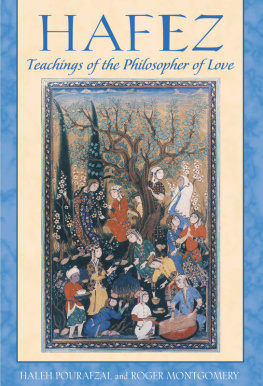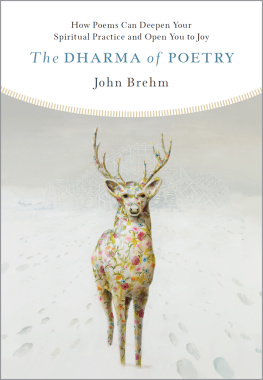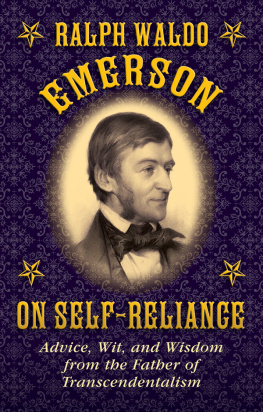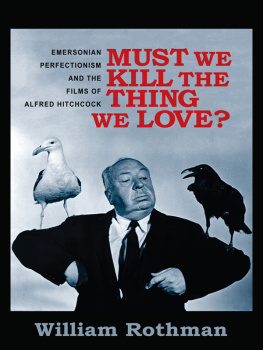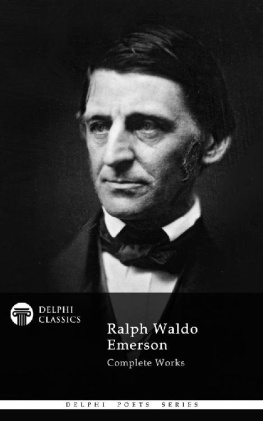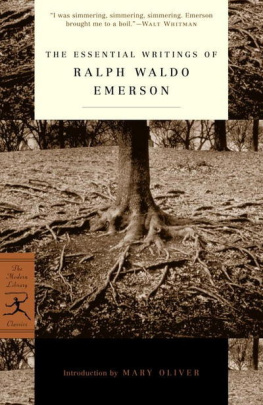HAFZ
Teachings
of the
Philosopher
of
Love
HALEH POURAFZAL AND ROGER MONTGOMERY
Abdol-Hossein Pourafzal, Literary Consultant

Inner Traditions
Rochester, Vermont
Acknowledgments
Gratitude to Halehs father and mother, Abdol-Hossein and Nahid Pourafzal, her brother Houman and her large extended family for their unconditional love and support of Halehs beautiful life and her work on this book. Her passion for her beloved Hafz was conceived within and nurtured by these extraordinary people.
During our work on the original manuscript, Haleh and I received valuable assistance from Mr. and Mrs. Rofougaran in Paris and from David Iino and May Murakami in Berkeley. The first edition benefited from Inner Traditions editors Jon Graham, Rowan Jacobsen, and Blake Maher; it has been a pleasure to work with Managing Editor Jeanie Levitan on this paperback edition.
A special word of gratitude must go to Ron Roththe man Haleh always called Teacher; to Halehs and my fellow monks in the Spirit of Peace Monastic Community; and to all the Celebrating Life spiritual family. Through Ron Roths acknowledgment of Haleh as a modern day Persian Mystic, and by the communitys appreciation of her teachings through and about Hafz, both the ancient poet and the extraordinary woman live on in so many hearts.
RM, NOVEMBER 2003

This new paperback edition of Hafz: Teachings of the Philosopher of Love is dedicated, with deepest love and gratitude, to my wife and coauthor, Haleh Pourafzal.
Haleh crossed over into the Realm of Spirit in November 2002, rejoining her revered teacher and guardian Hafz. Foremost among many treasures bequeathed to family and friends was her shining example of devotion to the beloved, a central tenet of her ancient Persian mysticism. The pages ahead, and especially her first-person chapter One Soul Standing Guard, reveal the depth of her commitment to the spirit of truth and unity that she always found in Hafz.
As we on this side of that mysterious veil continue our own journeys through life, may we all discover that precious nectar of silence and awareness that graced Halehs every day and helped create this book.
ROGER MONTGOMERY
Contents
Complete Ghazals
Notes on the Text
Various spellings of the poets name have appeared in the many translations of his work over the centuries. The authors consider Hafz to be the spelling that most accurately suggests the original pronunciation. Other spellings appear in the text when sources are quoted.

The distinction between the terms Iran and Persia is somewhat vague in contemporary English usage. Iran was the ancient name of a geographical area that includes the current country of Iran, which was so named in 1925. The Persians were one ancient Iranian tribal group, who gave their name to both the nation and culture that emerged two thousand five hundred years ago. In this text, Persian is used to describe elements of that culture, many of which exist to this day, and also Iranian persons who trace their family lineages to this unique heritage.
On my grave dont sit without wine and musician, so that I might wake up from the dead dance.
Hold me tight tonight, spirit, although I am old, so at dawn I wake up young from this trance.
Introduction
By Roger Montgomery
Y ou are about to meet one of humanitys greatest friends and most delightful companions, a man named Shams-ud-Din Mohammad. He lived long ago in the fourteenth century in the Persian city of Shiraz in what is now southern Iran. Shams-ud-Din Mohammad was a seeker of wisdom who became a poet of genius, a lover of truth who has transcended the ages. His timeless message of liberation invites us to meet him in the tavern of the human spirit, to share a cup of wine, and to enjoy a blissful vision of humanitys highest potential. He emphasizes the enjoy part.
Shams-ud-Din Mohammad took the pen name Hafz and cleverly inscribed that signature into the final verses of nearly all his hundreds of surviving poems. Through the centuries, Hafz has been read, memorized, recited, quoted, and loved by millions of people in one of the worlds most spiritually oriented societies. He remains Irans most popular poet to this day.
Hafz the poet was a synthesizer of knowledge, a thinker about the human condition, and a reporter on his own journeys into higher awareness. Like his Persian predecessors Jalal-ud-Din Rumi and Omar Khayyam, he was a poet of God. But his vision was so all-embracing that his writing serves more as a tool for pointing to the totality of the Creator than as a litany of praise. A superbly educated man in absolute command of the subtle beauty of one of the worlds most expressive languages, Hafz traced his roots of reference back to ancient Persia and extended his vision unimpeded into our own future. His mastery of poetic form empowered an endearingly informal style that has preserved his visionary content through the ages.
Hafz wrote of both the wine of the spirit and the wine of the grape. He burned with our hearts longing and bubbled with our minds humor. His full-length poems endure as in-depth essays on life, while virtually every individual couplet stands as a masterly homily of simple but profound advice:
Let neither pride nor rich delicacies delude you;
this worlds episodes extend not to eternity.
He also blends deep yearning with a thoroughly modern sales pitch:
Make this dealbuy from me this shattered heart.
Its worth is more than a thousand unbroken.
And sometimes he is just wry and witty:
Either dont bring home elephant riders
or build a house with a very strong floor.
Such is Hafzheart open, intellect detached and soaring, tongue in cheek, a lover of humanity. An incomparable weaver of the mystic and the hedonistic.
On a spring evening at a sidewalk caf in Berkeley, California, I sat with two of Hafzs very best friends, my coauthor Haleh Pourafzal and her father, Abdol-Hossein Pourafzal, whose lifes passion is the study of the poets works. Students from the University of California laughed and talked and dined around us. We three shared fine red wine as though the caf were a Persian tavern. Our talk could be of only one topic: the master poet Hafz.
I have been a Hafz lover for fifty years now, Hossein said with a smile. How long have you known him?
Only about five years, I laughed, as though discussing a neighbor down the street. Haleh introduced us.
Hosseins presence is that of a dignified Persian elder. He is a self-possessed man who misses none of the student activity around us. An attorney for forty years in Iran and France, he now splits his time between Los Angeles and Paris. His favorite spots in the world are the intellectually stimulating environments of coffee houses filled with chattering students. In Paris, where he lives fifteen minutes by Metro from thirteen million books in the Bibliothque Nationale, he frequents the Latin Quarter with fellow members of the Persian-Parisian literary establishment.
There is absolutely no subject of importance to humanity as we enter the twenty-first century that Hafz does not address in his poetry, Hossein said. A lifelong student of Persian linguistics, Hossein is the fifth-generation direct descendant of Ghaem Magham Farahani, creator of the contemporary Farsi prose form. Although his conversational English is fluid, it does not measure up to his masterly and intricate command of Farsi. Since his comments on Hafz must reflect subtle and sophisticated levels of thought, he switches to Farsi, and Haleh translates. The center of all Hafzs teaching is justice, and humanity is thirsty for justice now as never before. It is the perfect time for his teachings to emerge in the West.
Next page
